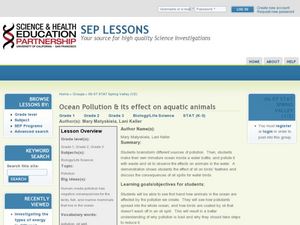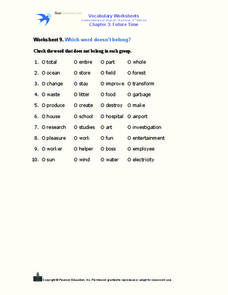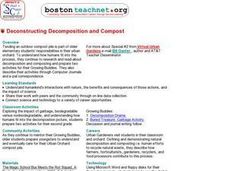Curated OER
Onion Skins
Students explore the structure of a plant cell. They carefully peel a single layer of onion skin from a slice of onion and stain it with methylene blue to observe the structures inside. They use a Digiscope connected to a computer to...
Curated OER
Ocean Pollution & its Effect on Aquatic Animals
Students consider the concept of ocean pollution. In this ocean instructional activity, students participate in a hands-on demonstration in order to replicate an oil spill and its effects on marine life.
Curated OER
Getting the "Yuck" Out
Young scholars examine various types of household materials for their usefulness as filters. They work together in teams to design a filtration system that produces the cleanest water in the shortest time.
Curated OER
Is There A Fungus Among Us?
Pupils experiment with fungi and yeast in order to determine their role in nature. Students study terms associated with fungi and yeast through this series of lessons.
Curated OER
Water Pollution Experiments
Fifth graders conduct experiments in simulated water pollution using a box of items to hold "pollutants"and an aquarium, representing a waterway. They observe how "rain" from a watering can poured into the box washes the pollutants into...
Curated OER
Global Environmental Change
Students examine environmental change of land, water, and air, discuss Clear Skies Legislation, and experiment on solid compaction and
resultant water filtration.
Curated OER
I'm Tellin'!: Kids Bringing Folktales Alive
Students participate in a reading lesson plan that works on social and academic skills. They increase reading comprehension with direct instruction with the group reading of a folktale. Then students research their own stories to tell.
Curated OER
Worksheet 9: Which Word Doesn't Belong?
In this words that go together activity, students analyze a group of four words and determine anything they have in common. Students check the word that does not belong in each group.
Curated OER
Commonalities and Differences from Africa to Cleveland as Evidence Through the Gullah Community Connection
Students explore Afro-American history. They identify the commonality between African, Carolinian and Cleveland Black culture. Students explore the water cycle, oceanography, hydrology and bio-geochemical processes. They discuss the...
Curated OER
Throw-Away Society
Students think about garbage disposal and the amount that we produce.
Curated OER
Children's Health: Children Aren't Little Adults
This lesson plan is a compilation of interdisciplinary, technology-infused activities that focus on the often complicated and sometimes controversial issues related to toxic chemicals in children's environment. Special emphasis is placed...
Curated OER
Changing How Things Look
Third graders use a literature study in order to investigate how organisms effect an ecosystem. They are asked questions about change taken from the book. Students also take a nature walk to make field observations.
Curated OER
Cell Structure and DNA
Sixth graders identify, locate and describe the function of the parts of a cell. In groups, they state the five stages of mitosis and put them in the correct order. They are introduced to the structure of DNA and mRNA and how they...
Curated OER
Deconstructing, Decomposition and Compost
Students create and tend to an outdoor compost pile. They research about decomposition and composting. They create two activities for their peers to complete.
Curated OER
Water Quality Monitoring
Students comprehend the four parameters of water quality. They perform tests for salinity, dissolved oxygen, pH and clarity or turbidity. Students comprehend why scientists and environmental managers monitor water uality and aquatic...
















